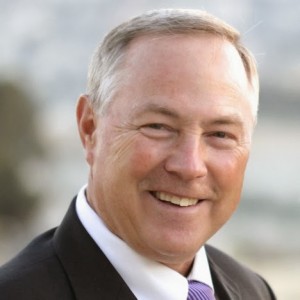“Everybody Has Worth”: HireVue’s David Bradford on Networking and His New Book

“I’m thinking to myself, first and foremost, ‘Hey, I’ve got a million things to do,’” says Bradford. “But, I recognized that, in all parts of our lives, there are times when people need a hand up.”
Bradford agreed to go. It was, by all accounts, a pleasant networking lunch. As Bradford was leaving, the sales rep said, “Hey, Dave, I appreciate you doing this lunch with me. What can I do for you?”
“I’m thinking to myself, ‘Oh, this guy can’t really help me out. I’m going to go onto my next meeting,’” Bradford says.
But the sales rep wouldn’t take no for an answer. “To his credit,” Bradford says,” he grabbed me by the shoulder and said, ‘No, Dave — what can I do for you?’”
Bradford thought about it for a moment. A deal that he was currently working on came to mind — one that required some funding. Bradford told the sales rep about the deal, and the sales rep told Bradford that he had a contact who might be of use.
“Long story short,” Bradford says, “I get an introduction — through this guy — to a Saudi prince!”
Bradford told me this story over the phone, and a version of it also appears in his new book, “Up Your Game: 6 Timeless Principles for Networking Your Way to the Top,” which I reviewed just a couple of days ago.
As title suggests, networking is Bradford’s focus throughout the course of the book: he offers his six principles of networking, and a wealth of anecdotes from his personal life illustrates how those principles work in real life. I chose to open with this particular story because I think it’s representative of both Bradford’s personality and his approach to networking overall.
Bradford is candid and generous — he’ll tell you exactly what he’s thinking, but he’ll also put aside his selfish concerns to help others out. And networking, in his eyes, is all about building strong relationships that foster reciprocity: “When you connect with people at a deeper level, then trust forms, and when trust exists, everything in the relationship accelerates,” says Bradford. “They’re willing to help you. You’re willing to help them.”
Networking: a Four-Letter Word?
In my review of “Up Your Game,” I mentioned my own personal misgivings about networking — at least, about what I’ve always understood networking to be. It seems callous and egotistical. It feels like I’m using people as means to an end.
I’m not alone in hating networking, and Bradford agrees that the practice can get a bad reputation, depending on the way we approach it: “So often, there is a taint to networking, because people think, ‘Oh, you’re connecting with people just to get something,’” he says.
Those of us who think “networking” is a dirty word are cutting ourselves off from a powerful career tool: as LinkedIn’s Talent Blog reports, outplacement experts Challenger, Gray, & Christmas found that networking is the most valuable tool in the job search, scoring highest of all search methods in a recent survey of HR executives, with a 3.98 out of five.
This is why Bradford’s take on networking is so attractive to me. He “flips the script” on traditional networking, turning it from a Machiavellian maneuver into a method of building compassionate, mutually beneficial relationships. According to Bradford, networking should help everyonewin.
You can see this in the six principles that sit at the heart of the book, and especially in the first principle. “[In the book,] I talk about the first principle of networking, which is to give without any thought of getting,” Bradford says. “You’re reaching out to do something great for somebody else.”
“When I show up at an event,” Bradford explains, “my first thought is, ‘For the people around me, what can I do to help them? What are their goals in life that I can help them achieve?’ So I’m working toward that. And when I go in with that attitude, things kind of change, and conversations flow more naturally, and you connect with people at a deeper level.”
Bradford also recognizes that networking is not just about career opportunities. It can be a way to spur personal growth, too. “You tend to run with people that have similar mindsets, similar values, and to me, there’s real value in diversity: diversity of thought, diversity of intelligence,” he says. “If you find yourself in a group where you’re always the smart guy of the group, you better find yourself another group. You’re really not learning from those around you.”
Bradford suggests that everyone maintain what he calls a “personal board of advisors.” “Find people that can help you identify your blind spots and where you may be lacking in a particular discipline or skill set,” he says. “Find some people that can augment that for you. Constantly be trying to augment your network and upgrading the people that you surround yourself with.”

Taking the Long View
One of the ways that Bradfordian networking (my coinage; only being semi-ironic) avoids the power plays of traditional networking is by focusing on the long term, rather than chasing more immediate results. Bradford calls it “networking before you need it”: building strong, lasting relationships with people before you ever need to call on them.
Bradford provides an example of what such networking might look like for a recruiter:
… [W]hen I’m contacted by a third-party recruiter, and they invite me to interview for a particular job, if they step back and say, you know, “Bob, this is a great company and whatnot, but honestly, it may not be the right fit at this point in your career for you, but let me suggest some paths you might want to look down,” the candidate then feels valued: “Hey, this person really cares about me.”
So in that sense I think, longer term, building that relationship, then that candidate for a job now might look to you in the future.
It may seem strange for a recruiter to be networking with a potential job candidate in this way, but this leads us to another one of Bradfordian networking’s interesting features: because it takes the long view, it opens us up to network with people we may have never even thought of as valuable contacts.
“Never underestimate the value that someone can bring to you or others,” Bradford says. “You just never know when that next referral, that next contact, may prove valuable. Everybody has worth, and everybody has contacts that might be useful for you.”
You can also see Bradford’s commitment to forward thinking in the way he uses technology as a networking tool, not an end in itself (social recruiters: take note). “The whole book emphasizes tools of technology versus these longer-term principles of connecting with people and building valuable and deeper relationships,” he explains.
According to Bradford, the principles of building valuable and deeper relationships are timeless. “Those things won’t change,” he says.
“What will change over time,” Bradford says, “are the tools of communication. We have these awesome 21st century tools of communication, from Instagram to Snapchat and onto things like Facebook, LinkedIn, FourSquare, etc. If we look forward 10 or 15 years from now, those things will not exist in the forms that we think of [today].”
Bradford believes that successful networking comes from overlaying the fundamental principles of networking onto whichever tools of communication we have at our disposal. For example: one of Bradford’s principles of networking is “Show Up.” That is, you have to actually be there — i.e., show up to places and events — in order to network. When you can’t physically show up, you can use technology: “You can show up online in a powerful way,” Bradford says.
Showing up online means more than just maintaining a few social media accounts. It means interacting with people and demonstrating your talents and your value to others. “When you show up on LinkedIn or Facebook or wherever, make sure that people see that you have expertise. Make comments that would demonstrate your skill set,” Bradford says. “I love it when I see people not just liking something that I posted, but actually commenting on it, and then commenting in a way that demonstrates their skill set or their expertise.”
Compassionate Business
At the heart of Bradford’s ascension to the top of the business world was networking, and at the heart of Bradford’s networking efforts was something surprising: love.
“Love is the foundation on which relationships are built,” he writes in “Up Your Game.”
But we don’t often hear about love in professional contexts. If anything, we’re told just the opposite: business is impersonal and totally objective. But Bradford doesn’t think that’s the best way to go about things, and he refers me to a study that supports his belief: in 2012, Australian School of Business lecturer and researcher Christina Boedker found a “a powerful link” between compassionate leadership and productivity.
“If you want to use the word compassion, in a professional setting, as opposed to love, that’s fine,” Bradford explains. “My point is that you need to truly feel at a deeper level, and to be compassionate with other people and your team members. Let them know that they are valued as individuals.”
According to Boedker’s study, leaders in “high-performing workplaces” were 19 percent more likely to recognize and acknowledge employees and 21.1 percent more likely to encourage employee development and learning, and they spent 29.3 percent more time and effort managing their people. In short, these leaders cared about their employees at a “deeper level.”
“Mark Newman, the current CEO of HireVue, is a great example of that,” says Bradford. “He genuinely cares about his people, at kind of a different level.”
“We all go through our challenges in life, whatever they may be,” Bradford adds. “If you can show people that you truly care, that you’re not somebody up there that’s more important than they are, you would be shocked at the results that you can get through compassion for your employee base.”
Epilogue
I couldn’t find a way to slip this story into the blog post, but I feel it needs to be shared:
At the end of our conversation, I asked Bradford if he had any other topics he wanted to cover. He did: me. He wanted to learn more about me.
This is the first time that has ever happened to me, and I’ve been conducting interviews for years now.
Bradford revealed that he had already checked out my web presence. He knew about my writing career. He knew where I went to college. We spent some time chatting about ESPN and the places we’ve both been to in Connecticut.
Bradford closed by giving me his email address. When I returned to my computer a minute later, he had already requested that I connect with him on LinkedIn.
What I’m saying is: this is a man who walks the networking walk.

